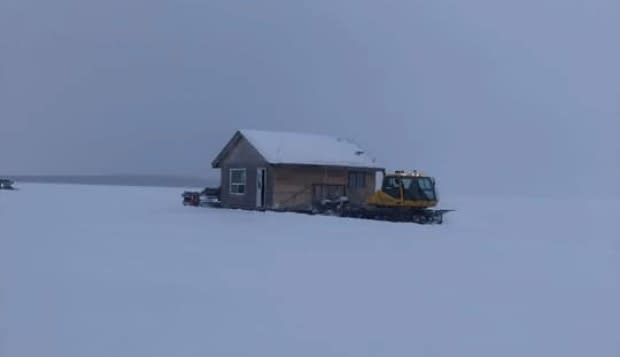Cabin seized by Sask. gov't 'integral' to trapper's way of life, First Nations leaders say, urging its return

First Nations leaders are calling on the Saskatchewan government to return the cabin of a northern trapper in the province so he can continue living a traditional way of life.
Indigenous trapper Richard Durocher learned of the seizure of his cabin, originally located about 40 kilometres north of Pinehouse, Sask., after a contractor hauled it away in early February.
Lac La Ronge Indian Band (LLRIB) Chief Tammy Cook-Searson said the province should put it back and grant him full access to his trap line. The province's Ministry of Environment maintains that despite the cabin seizure, "there are no restrictions on Mr. Durocher accessing his trap line."
"Many members from our First Nations still rely on their inherent and Treaty right to hunt, fish, trap and gather for their sustenance and health," Cook-Searson said in a written statement.
Cook-Searson spoke in a joint-statement issued by the Federation of Sovereign Indigenous Nations (FSIN), the Prince Albert Grand Council (PAGC) and LLRIB released on Wednesday.
Erecting a cabin is integral to the traditional method of hunting and trapping. - Brian Hardlotte, grand chief of the Prince Albert Grand Council
She said leaders want to resolve this to ensure the livelihood, health, and well-being of band members like Durocher.
Durocher is a sustenance fur harvester and his application to build his cabin was denied. He said he was encouraged by local Métis officials to "go ahead and build it because we have rights. We're going to take our land back."
A Ministry of Environment spokesperson said it had attempted to work with Durocher about relocating his cabin in the past.
The spokesperson said cabin builds aren't allowed within eight kilometres of either side of the Key Lake, Cigar Lake, McArthur Lake, Cluff Lake and Rabbit Lake roads. The Durocher family is known to have used the land for traditional activities long before the highway to the mine site was built.
The province also said the site is "popular with other users for camping, fishing and other recreational activities." For the Métis Nation-Saskatchewan, Durocher's case raises concerns about the priority of recreational use over traditional land use.
Second trapper's cabin removed
A second trapper's cabin was recently removed from the north shore of Dore Lake. It belonged to Travis Laliberte, a Métis trapper from Beauval who's now unsure if he'll be able to have a cabin ever again.
"I feel that not being able to ever have a trappers cabin now is like taking one of my Aboriginal rights away," he said in an emailed statement to CBC.
Laliberte said his original lease application was denied three years ago, because it was too close to the beach. He said he chose a different spot on a map — about 500 metres from the beach — and was approved. However, he said that when he saw that location in-person the land seemed unsuitable, so he built closer to the beach.
It appears that location runs afoul of Crown land guidelines which stipulate cabins must be more than a half-kilometre away from a beach which could serve a recreational purpose.
However, Laliberte says "a guideline that was created without consultation makes me believe it is only in place to benefit the person or people who created it."

Ministry of Environment defends decision
Brant Kirychuk, executive director of the Fish, Wildlife and Lands branch for the ministry, said Laliberte's cabin was indeed built on an unauthorized location on a pristine, sandy beach in a "very, very, very actively used area." He said complaints of the cabin came in "almost immediately."
The local land manager made attempts to help Laliberte choose a new "appropriate" location; "all resulting in non-compliance, so ultimately an order was issued under that Provincial Lands Act," according to Kirychuk.
Kirychuk said anyone who applied to build at the two sites would be denied. He added 100s of traditional resource cabins are approved yearly, but most are located in remote parts of northern Saskatchewan, and therefore face no "conflict."
When asked whether recreational activities were taking precedence over traditional practices, Kirychuk said "traditional rights are to conduct traditional activities: hunt, fish and gather" on Crown land.
He added they "consider all users in the area to determine if there is a conflict" when considering disposition.
Leaders says education required
First Nations leaders in the joint statement also argue that "building and maintaining a trapping cabin is reasonably incidental to the Treaty right to trap."
"Erecting a cabin is integral to the traditional method of hunting and trapping," said Brian Hardlotte, PAGC grand chief, in a statement.
"[B]uilding a cabin is protected by Treaty and ... the [Charter of Rights and Freedoms], and I fail to see which authority the province based its decision on removing this cabin," he argued.
The Ministry of Environment said in a statement on Wednesday that Durocher's cabin now belongs to the contractor who removed it, as it was forfeited to the Crown.
Durocher can apply again for a traditional resource use cabin and that Ministry staff are prepared to work with him to find a location they say is OK.
There are no other cabins under removal order by the Provincial Lands Act, at this time.


